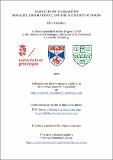Files in this item
Demystifying normativity : morality, error theory, and the authority of norms
Item metadata
| dc.contributor.advisor | Streumer, Bart | |
| dc.contributor.advisor | Hurtig, Kent | |
| dc.contributor.advisor | Snedegar, Justin | |
| dc.contributor.advisor | Evers, H. W. A. (Hendrik WIllem Adriaan) | |
| dc.contributor.author | Gerritsen, Eline | |
| dc.coverage.spatial | 221 | en_US |
| dc.date.accessioned | 2023-02-17T11:16:58Z | |
| dc.date.available | 2023-02-17T11:16:58Z | |
| dc.date.issued | 2023-06-12 | |
| dc.identifier.uri | https://hdl.handle.net/10023/27003 | |
| dc.description.abstract | We are subject to many different norms telling us how to act, from moral norms to etiquette rules and the law. While some norms may simply be ignored, we live under the impression that others matter for what we ought to do. How can we make sense of this normative authority some norms have? Does it fit into our naturalist worldview? Many philosophers claim it does not. Normativity is conceived to be distinct from ordinary natural properties, making it mysterious. The mystery fuels a radical yet prominent scepticism about the existence of normative properties: if they are too strange to actually exist, there is nothing we ought to do. Some take this to mean, moreover, that nothing is morally right or wrong. We must critically examine the ideas behind these theories, which put both morality and normativity in general on the line. The aim of this thesis is to unravel the mystery of normativity. It uncovers and objects to the influential non-natural conception of it, arguing that we can capture normativity with natural properties. In particular, it explores how the authority of norms can be explained by the commitments of the people subject to them. In connection to this, it challenges the conceptual claim behind the view that all moral judgements are mistaken. Finally, it reveals that treating morality as a mere fiction has revolutionary practical implications. This emphasises the importance of the overall conclusion: we need not conceive of either moral or normative properties as too mysterious to exist. | en_US |
| dc.language.iso | en | en_US |
| dc.rights | Creative Commons Attribution-NonCommercial-NoDerivatives 4.0 International | * |
| dc.rights.uri | http://creativecommons.org/licenses/by-nc-nd/4.0/ | * |
| dc.subject | Normativity | en_US |
| dc.subject | Norms | en_US |
| dc.subject | Morality | en_US |
| dc.subject | Error theory | en_US |
| dc.subject | Metaethics | en_US |
| dc.title | Demystifying normativity : morality, error theory, and the authority of norms | en_US |
| dc.type | Thesis | en_US |
| dc.contributor.sponsor | Prins Bernhard Cultuurfonds | en_US |
| dc.contributor.sponsor | Hendrik Muller Fund | en_US |
| dc.contributor.sponsor | University of Groningen | en_US |
| dc.type.qualificationlevel | Doctoral | en_US |
| dc.type.qualificationname | PhD Doctor of Philosophy | en_US |
| dc.publisher.institution | The University of St Andrews | en_US |
| dc.publisher.department | University of Stirling & University of Groningen | en_US |
| dc.identifier.doi | https://doi.org/10.17630/sta/290 |
The following licence files are associated with this item:
This item appears in the following Collection(s)
Except where otherwise noted within the work, this item's licence for re-use is described as Creative Commons Attribution-NonCommercial-NoDerivatives 4.0 International
Items in the St Andrews Research Repository are protected by copyright, with all rights reserved, unless otherwise indicated.


